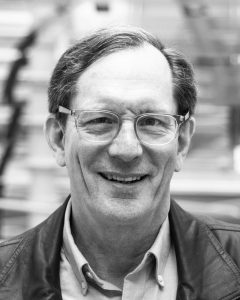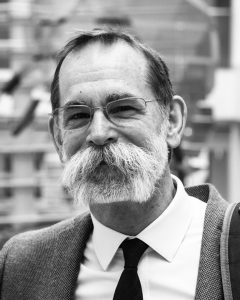In June 2019, a chemical spill in a Department of Chemistry laboratory led to a full department shutdown until a comprehensive safety assessment could be completed. Within days, most laboratories re-opened. Within weeks, the department had put into motion an unprecedented safety makeover in partnership with the Office of Environmental Health and Safety (EHS) and the College of Science. Since then, the college and EHS have enacted creative solutions to rebuild a culture of lab safety from the ground up—and it has paid dividends in implementing safeguards related to COVID-19.

Tommy Primo
“Everyone from the department level up to the President’s Office has made significant changes to how the U regulates laboratory safety,” said Peter Trapa, dean of the College of Science. “By the time COVID-19 hit, we had the right infrastructure, the right coordination between EHS and our own folks, so that we could quickly lead out in the COVID era.”
Committed committees

Matthew Sigman
At the time of the spill, the U’s laboratory safety culture had been through a series of internal and external audits, including one by the Utah State Legislature. The reports identified crucial gaps in safety and made recommendations for improvement. The U has made significant progress addressing these recommendations, including establishing and expanding the number and authority of college and departmental-level safety committees. Within the College of Science, the Departments of Chemistry, Mathematics, Physics & Astronomy and the School of Biological Sciences all have committees made up of staff and faculty who performed routine lab inspections and reported violations. The previous safety system’s structure allowed some violations to remain unresolved. Now, the committees are empowered to recommend how violations get addressed. They’ve also expanded their scope to include postdocs and graduate students who can make suggestions for outdated practices or areas that need attention. In the coming weeks, safety committees will be required in all University colleges.
“To change the safety culture, there has to be the motivation, and it has to be a grassroots effort,” said Matthew Sigman, Peter J. Christine S. Stang Presidential Endowed Chair of Chemistry. “This is a success because it’s collaborative, it’s conversational, and it’s pragmatic. It’s about building relationships and getting buy-in from the top down.”

Sarah Morris-Benavides
In January, EHS and the College of Science jointly hired Sarah Morris-Benavides as the first associate director of safety for the College. Morris-Benavides facilitates communication between researchers, and helps translate regulatory protocols between the college and EHS. She also heads the College of Science’s safety committee that is made up of the department committee chairs. She and the committees have worked closely to ensure that classes and research are conducted safely in light of the coronavirus restrictions.
“I can’t tell you how valuable they’ve been,” said Morris-Benavides of the response to COVID-19. “We had a great benefit that these committees were already established and in place.”
Every month, the college safety committee meets to discuss each department’s safety protocols. “We have the ability to say, ‘Well, here’s something that they’re doing in biology. Does that make sense for physics?” she said. “Chemistry learned a lot from their amazing safety turnaround, and they’ve shared their best practices. It all benefits every department.”
Precipitating solutions

Selma Kadic
The U overhauled the previous laboratory safety system by restructuring EHS directly under the Vice President for Research Office, and Frederick Monette became its new director. This helped rebuild trust between the EHS and researchers, who had historically been at odds.
“Fred Monette was all in right away. His willingness to sit down with people, listen to their concerns, and back it up financially meant a lot to the people in the department,” said Holly Sebahar, professor of chemistry who was the chair of the chemistry safety committee at the time of the shutdown.
Safety violations can be complicated; some are easy fixes, such as ensuring lab members wear proper PPE, but other issues are expensive, such as electrical or ventilation upgrades within older buildings. Traditionally, the burden of arranging infrastructure upgrades and their cost often fell solely on the principal investigator (PI) of the laboratory in question.

Angus Wu
To change that, EHS and the College of Science lobbied for an infrastructure improvement project to fund overdue, expensive safety upgrades in College of Science buildings, many of which were identified as deficiencies during the chemistry shutdown. The resulting $1 million capital improvement project will address electrical upgrades, seismic bracing, and ventilation improvements in several buildings, beginning in January 2021. Addressing these deficiencies in one comprehensive project will be much quicker, more economical, and result in less disruption to laboratory operations compared with the past approach of fixing each issues one by one at the request of individual laboratories.
Working with the College of Science, the VPR Office facilitated the purchase of 20 new refrigerator/freezers rated for storage of flammable chemicals to replace units that failed to meet regulatory requirements, sharing the cost 50/50 with the PIs. These initiatives demonstrated the administration’s commitment to promoting a culture of safety across the university.
From the ground up
As another example of a changed safety culture, the Department of Chemistry aims to incorporate safety in all aspects of academic life. Every speaker, seminar and many group meetings now incorporate a ‘safety moment,’ with each presenter asked to share an example of a safety incident and how they addressed it.

Shelley Minteer
“We have upwards of 30 or 40 external visitors a year. That’s a lot of safety moments. They’ll walk through that experience, then walk through the lab procedures to fix the problem,” Sigman said. “It’s a lessons learned, but also it’s an open conversation. We want to have the lowest risk, but we know when you sign up to be a chemist, you have the danger. Even when you cross the t’s, dot the i’s, something can happen.”
The collaborations go beyond the science—last year, EHS, the College of Science and the College of Mines and Earth Sciences co-hosted a two-day lab safety symposium with speakers and training sessions that addressed all types of issues, from chemical storage to creating effective safety committees. More than 400 staff, students and faculty attended the mandatory event to emphasize that every individual is responsible to making their environment safe. The U is applying that same philosophy for COVID-19.
“As we started going through the safety culture changes, we realized that it’s not that students or post docs or faculty won’t follow safety protocols, they will, if they know where they are, if they can find the paperwork,” said Shelley Minteer, associate chair for faculty for the Department of Chemistry and COVID-19 coordinator for the department. “We learned a lot from the safety ramp up. We need clear guidelines and good communication. We’ve been applying those same principles to COVID.”

 That’s when I began the process of envisioning and creating the Virtual Symposium platform, as it’s now known. I started with identifying the critical elements of an in-person research symposium and considering how to transpose them to a virtual model. My experience teaching and using Canvas (used to deliver course content) shaped the content, and with the collaboration and support of Micah Murdock, Associate Director of Teaching and Learning Technologists (TLT ), a novel virtual research symposium was fully realized.
That’s when I began the process of envisioning and creating the Virtual Symposium platform, as it’s now known. I started with identifying the critical elements of an in-person research symposium and considering how to transpose them to a virtual model. My experience teaching and using Canvas (used to deliver course content) shaped the content, and with the collaboration and support of Micah Murdock, Associate Director of Teaching and Learning Technologists (TLT ), a novel virtual research symposium was fully realized.







